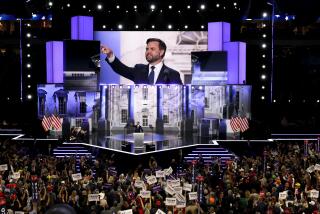Reagan Turns Raconteur at Jaycee Lunch
Since he left the White House three years ago, Ronald Reagan has become the master of the Hollywood cameo appearance.
There he is on a quick segment on the news at 11, blowing out his candles at his 80th birthday party, or breaking ground for his presidential library, or stepping out of limousines for elegant charity dinners--always with wife Nancy at his side.
In retirement even more than in office, it seemed, “The Great Communicator” preferred to communicate in carefully orchestrated pictures and sound bites.
But on Wednesday afternoon, Reagan seemed to loosen up and share with the public the kinds of jokes and rollicking anecdotes he is known for telling in private.
“You know,” he joked before a sellout crowd at a luncheon of the Los Angeles Junior Chamber of Commerce, “When he (Iraqi President Saddam Hussein) was born, they didn’t give his mother a medical bill--they fined her for dumping toxic waste.”
With that icebreaker, many of the more than 400 men and women in the Biltmore Hotel’s Crystal Ballroom turned to each other over their raspberry parfait desserts, uncertain how hard they were supposed to laugh at what was scarcely typical Oval Office diplomacy.
Here was a man many of them were too young to vote for in 1980, and had never seen in the flesh: Ronald Reagan the Raconteur.
To be sure, much of Reagan’s prepared 20-minute speech was standard for what he calls the “mashed potato circuit”--entreaties to young businessmen to become “citizen politicians,” pleas for Americans to rise up and demand a constitutional amendment requiring a balanced budget, and an enduring faith that America will only get better as it grows older.
But there were also the anecdotes, some of which appear in his memoirs and others that seemed new. Most came in extended answers to five questions asked by Jaycees selected in advance.
“You know how to explain the Middle East?” he asked the crowd in answer to a question.
“A scorpion came to a stream there in the desert and there was a frog. And the scorpion said, ‘Oh, I can’t swim, will you carry me across?’ And the frog said, ‘If I make that mistake, I’d die.’
“With those words, the scorpion said, ‘Any fool would know we’d both die (if I did that) because I can’t swim.’ Well that made sense, and the frog said ‘Get on.’
“In the middle of the stream, the scorpion stung him. And the frog said . . . ‘Now, we’re both going to die. Why did you do that?’ And the scorpion said ‘This is the Middle East.’ ”
That joke, about the seeming impossibility of bringing peace to the Middle East, was told impeccably. Reagan, at 80, has not lost his timing, either reading from a script or departing from it, as he did often Wednesday.
“I have well exceeded my life expectation when I was born, which is a source of annoyance to a lot of people,” the former actor quipped at one point, adding that he had gone to Washington, lived in “public housing,” and now finds himself “out of work.”
At his first economic summit as President, Reagan said, he looked around and found himself in the company of six of the world’s most important leaders “calling each other by their first names.”
“I listened to that,” he said. “I was the new kid in school and I hadn’t opened my mouth. And finally I said, ‘My name is Ron.’ ”
John Paulson, president of the local Jaycees, sat near Reagan at lunch Wednesday. He said the former President kept up a steady stream of both humorous and serious anecdotes about his White House years.
Reagan told the table, for example, that he learned to trust Soviet leader Mikhail Gorbachev through his “deeds,” rather than his words, Paulson related. It became a habit of his, Reagan said, to put a small piece of paper into Gorbachev’s hand when they met that contained the names of a handful of Russian citizens who had suffered human-rights problems. Invariably, he said, they would wind up with U.S. visas a few months later.
Others at the table said Reagan disclosed that he told Gorbachev at one summit meeting that Moscow would ultimately lose the arms race.
“I stood up, looked at him across the table,” they quoted Reagan as saying, “and said, ‘We’re going to have to start destroying weapons, because if we continue the arms race, you will lose, because of the resolve of the American people.’ ”
More to Read
Get the L.A. Times Politics newsletter
Deeply reported insights into legislation, politics and policy from Sacramento, Washington and beyond. In your inbox three times per week.
You may occasionally receive promotional content from the Los Angeles Times.










